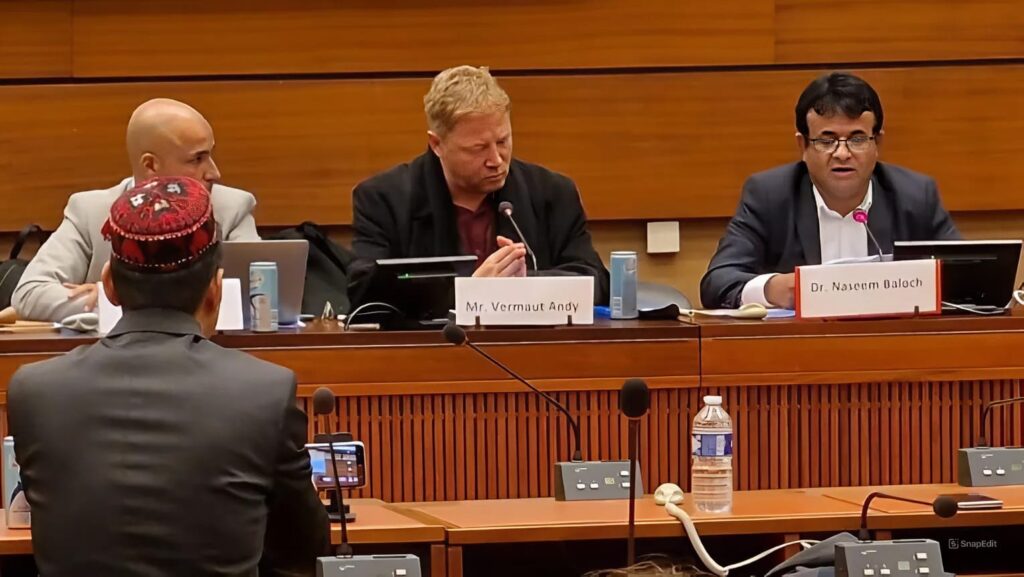As the Chairman of the Baloch National Movement (BNM) and a survivor of enforced disappearance, I share the story that mirrors the plight of thousands of Baloch men, women, and children who have suffered the same fate under Pakistan’s brutal policy of enforced disappearances. This deliberate strategy aims to silence the Baloch people’s aspirations for freedom.
Since the forced annexation of Balochistan in 1948, the Baloch people have endured systematic exploitation and oppression. The state’s campaign of terror encompasses enforced disappearances, extrajudicial and custodial killings, and torture, all designed to quash resistance to Pakistan’s occupation of Balochistan. Pakistan’s undeclared war against the Baloch has caused untold suffering.
Today, the situation in Pakistan is dire, with several internment centers where thousands of Baloch, Pashtun, Sindhi, and Kashmiri individuals are being held without trial. These centers operate as black holes of injustice, where detainees suffer inhumane torture and the loss of dignity. The accounts from survivors are harrowing, revealing psychological and physical torment. Many of the disappeared are never seen again, their bodies discarded in mass graves.
The United Nations Declaration on the Protection of All Persons from Enforced Disappearance unequivocally states that such acts are offenses against human dignity. In Pakistan, however, enforced disappearances are weaponized as a tool of state repression. Thousands of Baloch and Pashtuns have vanished, leaving their families trapped in uncertainty and grief. These disappearances are not just individual human rights violations, they are attacks on the fabric of our society and an affront to our collective dignity.
The International Covenant on Civil and Political Rights (ICCPR) and the International Covenant on Economic, Social, and Cultural Rights (ICESCR) both affirm the right to self-determination, a principle enshrined in the United Nations Charter. Yet, despite these international obligations, the Baloch people are denied the basic right to shape their own future. This denial of self-determination is at the core of the ongoing human rights violations in Balochistan, as the Pakistani state continues to respond to our demands for freedom with extreme violence.
One of the most blatant examples of this repression is unfolding in Gwadar, a city of profound cultural and historical significance to the Baloch people. Gwadar, which has become the starting point of the China-Pakistan Economic Corridor (CPEC), is now being transformed into a militarized zone. The fencing of the city has isolated local residents from their own land and resources, effectively treating the Baloch as outsiders in their own homeland. They are now unable to enter their city without military approval.
The strategic importance of Gwadar extends far beyond the local region. Its location near the Strait of Hormuz, one of the most critical chokepoints for global oil trade, positions it at the center of China’s broader geopolitical ambitions. Through its partnership with Pakistan in the CPEC project, China seeks not only economic dominance but also control over this vital maritime route. The fencing of Gwadar is not only about controlling the Baloch people—it represents China’s efforts to secure influence over a region critical to global power dynamics.
China’s involvement in Balochistan has only exacerbated the human rights crisis. While CPEC is often presented as a development initiative, for the Baloch people it signifies further exploitation. Our land’s rich natural resources, including gas, gold, and copper, are being systematically looted, while entire villages are uprooted to make way for infrastructure projects such as the Gwadar port. CPEC does not promise prosperity for the Baloch; instead, it is yet another mechanism of marginalization and dispossession.
China’s ambitions go beyond economic interests. By securing Gwadar, China is positioning itself to project power over the Strait of Hormuz, granting it leverage over the global energy trade and heightening regional tensions. The military control of this vital region is part of China’s broader strategy to influence global power dynamics.
The ongoing human rights abuses in Balochistan demand urgent international attention. Pakistan must be held accountable for its actions. We demand an independent investigation into the enforced disappearances, extrajudicial killings, and torture taking place across Balochistan. Moreover, we call for the imposition of sanctions against Pakistan for its persistent violations of human rights. The international community must stand in solidarity with the Baloch people in their struggle for self-determination and freedom. This is a fight for our very survival, and we need the world’s support to ensure our future.
In conclusion, the world cannot remain silent. Silence is complicity. We cannot afford to be passive witnesses to the unfolding genocide in Balochistan. Now is the time for action.
Long live free Balochistan.
Long live all oppressed nations in the region.
Dr. Naseem Baloch delivered this speech on the sidelines of the 57th session of the United Nations Human Rights Council. The event was organized by the Tumuku Development Cultural Union (ECOSOC) and chaired by Fazal Ur Rehman Afridi, Principal Representative of the Tumuku Development Cultural Union (ECOSOC)



